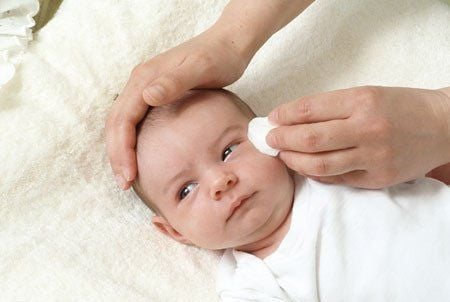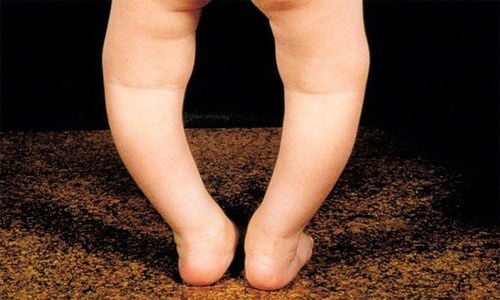This article is based on the expertise of Dr. Tran Thi Linh Chi, Specialist II and Deputy Head of the Department of Pediatrics and Neonatology at Vinmec Hai Phong International General Hospital.
In addition to tips for properly sunbathing newborns, many parents wonder about the appropriate times for sunbathing newborns. It is generally recommended to sunbathe babies before 9 a.m. and after 4 p.m.
1. Sunbathe your newborn in the morning
Newborns can be sunbathed about 1-2 weeks after birth to help their bodies synthesize vitamin D from breast milk. The ideal time for sunbathing is between 6 a.m. and 9 a.m., when the sunlight is gentle and the levels of infrared and ultraviolet rays are relatively low, making it suitable for promoting metabolism. Besides, the morning air is also fresh, and the sunlight during this period is not strong enough to harm a baby's delicate skin. It is advisable to let newborns sunbathe outside for about 20-30 minutes each morning. For newborns sunbathing for the first time, it is recommended to start with about 10 minutes and gradually increase the duration as they become accustomed to it.
The specific time for sunbathing depends on geographical location and the seasons of the year. Here are some guidelines:
Summer: The sun rises earlier and is more intense during this season. Parents should take the opportunity to let their babies sunbathe before 7 a.m. to avoid the harmful effects of ultraviolet rays on their children’s sensitive skin. The ideal time for sunbathing is between 6 and 7 a.m. when the sun has just risen with its first rays. After this time, it is advisable to avoid exposing your baby to the sun.
Fall: As the weather cools down, you can sunbathe a bit later, but it is still advisable to do so before 9:00 AM.
Winter: During this season, weather conditions are often cloudy and cold, with the sun rising late and the sunlight being weak. Therefore, parents should wait until the weather warms up before taking their baby out for sunbathing.
2. Sunbathe your newborn in the afternoon
If parents are busy at work or cannot sunbathe their newborn in the morning, they may wonder what time is appropriate for afternoon sunbathing. It is fine to let your child sunbathe after 4 p.m. when the sunlight is weaker and more gentle.
3. Time for babies to avoid sunlight exposure
Parents should keep in mind the following guidelines to ensure proper sunbathing for their newborns without causing skin damage or increasing vulnerability to diseases:
Avoid sun exposure after 9 a.m. and until the afternoon sunlight is still strong: The ultraviolet rays from the sun are strongest during this time. It is essential to keep your baby out of direct sunlight.
Limit swimming in strong sunlight: Not only should newborns avoid strong sunlight, but children under 8-9 years old should also refrain from playing outside in intense sun to prevent health issues associated with excessive exposure.
Hot Days: Parents should limit their children's sunbathing during excessively hot days to reduce the risk of dehydration from excessive sweating and to prevent common illnesses in children during the hot season.
Cold Days: Conversely, when the temperature drops or on windy days, newborns do not need to be sunbathed. Keeping their health as a priority is crucial.
Weather Changes: Erratic climate changes can easily lead to illness in babies. Parents should avoid taking their babies outside for sunbathing during such unpredictable weather conditions.

4. Proper sunbathing guidelines for newborns

In addition to paying attention to what time of day you should sunbathe your newborn, parents can also refer to some of the following instructions for properly sunbathing your newborn:
Babies can begin sunbathing safely 1 to 2 weeks after birth.
Start with a maximum of 10 minutes of sun exposure, gradually increasing to no more than 20 minutes at a time.
Choose a quiet, clean, airy, and fresh location, free from drafts and dust.
Ensure that sunlight does not shine directly into your baby's face, eyes, or head to avoid any potential risk of affecting the brain.
The sun’s rays should shine directly on the baby’s skin. Therefore, remove your baby’s clothes during sunbathing and avoid doing so through glass doors.
Start by allowing the sun to shine on your baby's legs, then slowly turn them to let the sunlight reach their back.
Pause sunbathing if your baby is ill or if it’s particularly cold. If you still wish to sunbathe during these times, make sure to dress your baby warmly, exposing only their calves, thighs, and arms.
After sunbathing, be sure to dry any sweat and hydrate your baby with some extra water.
Sunbathing offers numerous benefits for newborns, especially in preventing rickets and bone deformities. While the process of sunbathing may seem simple, parents need to understand the minimum principles involved in sunbathing the newborn properly. Timing your baby’s sunbathing is especially important to help them synthesize maximum vitamin D while avoiding harmful rays.
In addition to sunbathing, parents should focus on proper nutrition to enhance their children's immunity. Incorporating foods rich in lysine, essential micro-minerals, and vitamins, such as zinc, chromium, selenium, B vitamins, etc; can support the immune system and reduce the incidence of illnesses and digestive issues.
Parents can explore more about:
Guidelines for proper sunbathing to supplement vitamin D for babies.
The relationship between vitamin D and infection resistance.
Visit Vinmec.com regularly for useful information on caring for your baby and family as a whole.














